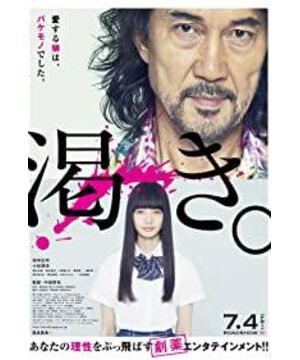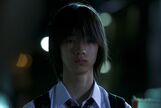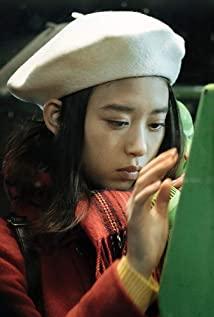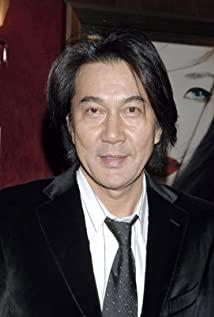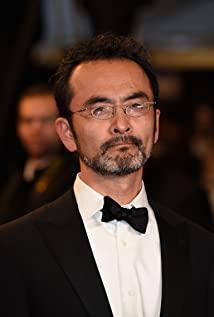Talking about real violence, let alone restoring violent scenes, fans who don’t want to see a large intestine and a broken wrist in a movie with hundreds of people, please think twice before entering.
But the most violent thing is: it captures the poison that is out of control.
"eager. "The plot is quite classical. The plot tells the story of a retired police officer, Hiroji, who received a call from his divorced wife. He heard that the whereabouts of Komatsu Nana, the daughter of the third year of high school, was unknown for several days, so he set off to look for it.
At first glance, it looks like the Japanese version of Taken, doesn't it?
But this is by no means the heroic deeds of saving children by virtue of family affection, but a super villain drama that is out of control and has no return, degenerates to the point of no sympathy.
We will not see a retired police officer Liam Neeson (Liam Neeson), he has a wealth of experience in the face of crime, neat skill and high-strength, hot topic nationwide;
instead, we have a form of bipolar disorder a Yakusho Division, he Residual, irresponsible, alcoholic, with a record of domestic violence, used to "solve all difficulties" with violence and alcohol.
We don't see a missing daughter, Maggie Grace, enjoying student life with a simple personality, only to be unfortunate enough to have an accident;
instead, we have a cardamom-aged Komatsu Nana, who shoots along with the plot. , The story of drug trafficking, instigation, abduction and abduction, which emerged gradually, challenged the audience's moral bottom line for minors again and again.
"eager. " is made by Koji Koji, a not-so-heroic Lien Nison, who fights with not-so-righteous fists and feet to save a not-so-innocent daughter, Maggie Grace.
When this manic-depressed and violent police officer collects various clues, but encounters gangsters and gangsters who are attracted by his daughter's drug trafficking, in order to find the truth, he naturally beats the blood.
Violence does exist.
In "Desire. "The ubiquitous figure of violence.
The way people communicate individually is violent: the violence of words, the violence of fists and feet, the violence of knives, the violence of rape.
The space where people live collectively is also violent: the violence of school bullying, the violence of family imbalance, the violence of gang competition.
It doesn't matter if the violent plot is filmed, this film even more vividly captures the sense of presence that makes one's whole body uncomfortable, as if the violence is imposed on oneself. Watching the entire film is like having experienced dozens of lingering delays.
The daughter did not appear, and the violence continued.
"eager. ” This “smoke of gunpowder and blood and blood, and the execution ground is the same as the drug cave”, has removed all the righteousness that “father saves the daughter” and “fighting crime” should have. A challenge that is neither dare nor unwilling to undertake. why? Because when the color called justice peels off, the hero seems to behave like a criminal. We audiences are too easy to be whitewashed by the language of the camera. The pain of being beaten up and the nausea of being sodomized have all become "action scenes" and "black humor" that can be understated. Imagine Batman slashing the Joker's lips while laughing and saying "why so serious. Imagine Superman yelling "Long Live Capital" while shooting lasers at Rex's men. Imagine Han Solo capturing a group of Imperial soldiers and throwing them for a thousand years. The Eagle left its universe to fend for itself... How brutal and abnormal would such an image be? It is only by being close to the hero's tight clothing, close to the hero's hiding mask, that we can intuitively justify the violence of these heroes, even if violence is still violence.
"eager. "The only violence that can be downplayed in the whole play is only the head-to-head battle between Ryo Odagiri and Hiroji Yasushi, which was so ridiculous! Odagiri was shot twice in the heart, and he was still alive. He still shot with a broken finger, while Koji Yakusho used a jumping shrimp posture to escape the fatal shooting inconceivably. A short copy of Quentin Tarantino's "Death Proof". The absurdity of the scene has become the only humor in the whole film that is not intentional.
To say that the entire film is greatly lacking, it should be that the theme is too narrow and not worthy of the grand pattern after the suspense.
What is the purpose of this journey to find women? When we know: this father does not love his daughter, and he has never cared about it for many years; this daughter hates her father's irresponsibility, and looks at her family as ugly for many years..., what is Koji Koji for? Coupled with the multiple simultaneous timelines in the story, jumping in Komatsu Nana's student days, it is full of the pure love-hate and relationship mode emotions of minors, and the motives behind the father and daughter also naturally become the finale of the whole film. Foreshadowing content.
The theme of the film is one emotion: "Love and Hate".
Are love and hate really so far apart? Behind the seemingly repulsive affection, is there also intimacy and selfishness? The father is eager to find out his daughter and beat her, and the daughter searches for the offline and throws the fire pit. Behind the black motive, is there a goodwill that can only be expressed in this way?
.... This kind of thought, middle school students and high school students have experienced it.
It's not really a great idea. Talented Canadian director Dolan only captured the teenage love-hate wave with "I Killed My Mother" five years ago, compared to "Desire." "Accompanied by killing each other and slashing each other, a group of big men played with children's minds here, and they couldn't help but enlarge the childish feeling of people's feet.
However, the film itself is still good enough. This is due to the strength of the filming motif accumulated by director Tetsuya Nakajima over the past ten years.
Tetsu Nakajima also filmed "Confession" (こくはく) in 2010, talking about the tragedy of young teachers' blood-stained campus; , talking about the tragedy of the old police officer blood-staining the streets.
The intrigue of adults, the exclusion of minors from the community, and the ultimate loss of control of the humanity above it... "Confession" and "Desire." "The motifs can be said to be very similar.
Are these themes Tetsuya Nakajima's personal aspirations? Unfortunately not. Nakajima is not a big believer in personal films, all the films he makes are originals. "Confession" is adapted from Minato Kanae's 2007 novel of the same name, "Desire. "Adapted from Fukamachi Akio's 2005 work "Endless Longing" (果てしなき渇き).
However, even though Nakajima has made films since his debut, we can't help but see that his works always draw a common focus, that is, paranoid people.
Kawajiri Matsuko (Nakatani Miki) is paranoid, Moriguchi Yuko (Matsulongko) is paranoid, and Fujishima Showa (Yakusho Hiroji) and Fujishima Kanako (Komatsu Nana) are of course paranoid.
Paranoid people do not necessarily rebel against society, but they will only cooperate happily with society when their interests are shared; at the same time, paranoid people will definitely be reckless and defend their own values by insulting and hurting others. Stretching the ladder is funny, but it will never be included in the life options of the deviant.
Nakajima can always photograph why and how these bigots are biased. Nakajima is better at presenting a kind of diversity under one element: in his plots, the rigid values of the paranoid do not necessarily match the audience's intuition.
When the audience watched "Confession", sympathized with Yuko Moriguchi, and supported her to avenge her husband, the audience immediately faced the moral problem that her Yuko implicated countless innocent students.
However, when the audience watched "Desire. ", when witnessing the journey of removing the halo of a heroic father and using violence to control violence and no romance, the re-understanding of violent images and the connection of family affection should be a strong tie in the eyes of ordinary people, but it is a prison. Hiroji and Komatsu Nana, the father-daughter pair's most inexplicable lack of interpretation, is the audience trying to figure out the situational problems that the violent bigots are thinking.
I can only guess that when Tetsuya Nakajima was also selecting these original works, he more or less found out what his artist’s eyes like to focus on and what he is good at depicting. In the end, what he picks out is a series of common features. Movie.
In short,
"desire. "The core concept of "Love and Hate" is difficult to match if you want to match the social pressure of the theme of Nakajima's previous work "Confession"; The screenwriting ability that has been cultivated makes "Desire. "creates a dizzying and uncomfortable atmosphere from time to time, but a compact and successful landscape. Undisguised and unadorned, the violent elements that have not diminished until the end have once again refreshed the standard of Japanese movie genres that many people secretly dislike.
Even if the camera has become a little self-indulgent later, "Desire. " is still definitely one of the top choices for noir movies worth watching in the second half of the year. I'm also looking forward to Nakajima's next "Paranoia" adaptation.
View more about The World of Kanako reviews


